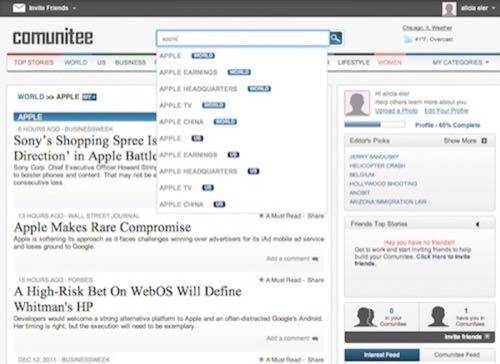Comunitee is a new social network with the news-obsessed reader in mind. It purports to deliver news based on the your reading patterns, cutting away the clutter that you see on social networks that were not built with news as the main type of content. Its name is a mashup of the words “community” and “committee,” which is the driving concept behind this combination social network and news site.

In its attempt to be as simple as possible, Comunitee employs a combination of social network functions, including Lists (Twitter and Facebook), Circles (Google+), socially relevant news (Digg), personalized news apps (Zite, Flipboard, News360), news based on your social graph (Facebook), frictionless sharing (Facebook), discovery (StumbleUpon) and news based on your interest graph (Twitter).
When you log-in to Comunitee, you first tell it what categories and subsequent keywords you are interested in. For example, under Technology I selected Apple, Apps, Gadgets, Google and Hacking; in the Entertainment category, I narrowed it down to Books and Hip Hop. Now Comunitee knows a few of my interests. In the Comunitee section, I can choose to invite friends from Facebook and LinkedIn, and via email. Employing a similar logic as Facebook Lists, the friends that do filter in from those networks can be organized into comunitees of friends, co-workers, and custom.

Comunitees are organized a lot like Google+ Circles. For example, “Tech Entrepreneurs” might be its own comunitee, much like it could be its own circle on Google+. This comunitee will curate all the news that falls under this topic based on other users’ reading patterns. You can also switch it up by allowing one of your “comunities” to curate a section of the site. For example, if you choose Tech and then select your “Tech Entrepreneurs” comunitee, your Tech section is curated by the that comunitee. As you build a presence on Comunitee, you will earn Foursquare-like badges.
Comunitee also employs the idea of frictionless sharing. Unlike Facebook, which sprang seamless sharing on its users, Comunitee users sign up for the site already knowing that every article clicked will automatically show up in their My News section, which is created organically. By tracking a user’s reading patterns, it surfaces content that matches your interests. All other news is categorized into “All News,” “Interest Feed,” which is just based on the interests you select. “Comunitee Feed” is a feed of news from your curated comunitees.

“Our goal with Comunitee is to make consuming personalized/social news as simple as possible,” Comunitee CEO Don Daszkowski tells me. “Every time we think about incorporating a new feature we ask ourselves if it fits our model which is ‘users are expected to read news and invite friends.’ We want to make the user experience is as easy as possible.”
Social news site Digg does over a personalization section, but Comunitee takes that a step further by bringing in friends from Facebook and LinkedIn. You can also invite friends via email. Unlike Digg, Comunitee isn’t interested in asking users to vote articles up or down. The site does all of that for you. In that sense, Comunitee is similar to discovery engine StumbleUpon, which organizes content based on your taste graph.
Comunitee is an interesting concept, but the site itself employs so many different aspects of the social web that it might actually be making itself more complicated.
















